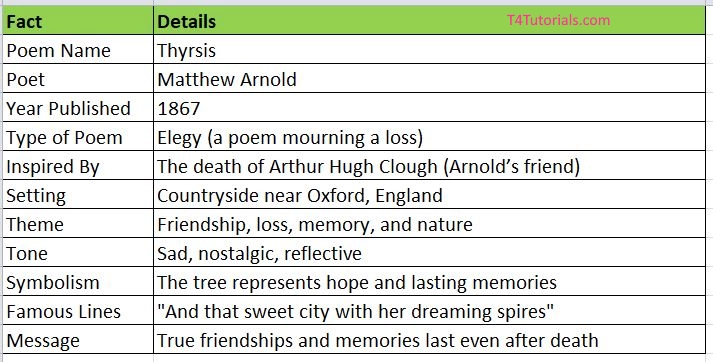Thyrsis is a poem about the poet’s deep sorrow over losing his friend, Arthur Hugh Clough. The poem is written as an elegy, which means it is a poem that mourns someone’s death. Arnold remembers their time together and the beautiful countryside near Oxford, where they used to walk and talk about life.
In the poem, Arnold uses the character “Thyrsis” to represent Clough. He compares his friend to a lost shepherd, symbolizing a person who has gone too soon. The poet also describes a famous tree that stands strong in the landscape, representing hope and lasting memories. As he walks through the countryside, he feels sad that his friend is no longer there, but he also finds comfort in remembering the past.
The main message of the poem is about loss, memory, and the lasting impact of true friendship. Even though people may leave this world, their influence and memories stay forever.

Questions about Thyrsis by Matthew Arnold
| Question | Answer |
| Poem Name | Thyrsis |
| Poet | Matthew Arnold |
| Year Published | 1867 |
| Type of Poem | Elegy (a poem mourning a loss) |
| Inspired By | The death of Arthur Hugh Clough (Arnold’s friend) |
| Setting | Countryside near Oxford, England |
| Theme | Friendship, loss, memory, and nature |
| Tone | Sad, nostalgic, reflective |
| Symbolism | The tree represents hope and lasting memories |
| Famous Lines | “And that sweet city with her dreaming spires” |
| Message | True friendships and memories last even after death |
MCQs from Some Famous Poems of Matthew Arnold
- MCQs Thyrsis by Matthew Arnold
- MCQs – Dover Beach by Matthew Arnold
- MCQs – The Scholar-Gipsy by Matthew Arnold
- MCQs – Empedocles on Etna by Matthew Arnold
- MCQs – The Forsaken Merman by Matthew Arnold
Summary of Some Famous poems of Matthew Arnold
- Summary – Dover Beach
- Summary – The Scholar-Gipsy
- Summary – Thyrsis
- Summary – Empedocles on Etna
- Summary – The Forsaken Merman
Famous English Authors MCQs
- William Wordsworth MCQs
- William Shakespeare MCQs
- Robert Browning MCQs
- W B Yeats MCQs
- Edmund Spenser MCQs
- Chaucer MCQs
- John Milton MCQs
- S T Coleridge MCQs
- Lord Byron MCQs
- PB Shelley MCQs
- John Dryden MCQs
- John Keats MCQs
- Charles Dicken MCQs
- Alfred Lord Tennyson MCQs
- Charles Lamb MCQs
- D.H Lawrence MCQs
- Thomas Hardy MCQs
- Matthew Arnold MCQs
- John Galsworthy MCQs
- George Bernard Shaw MCQs
- T.S Eliot MCQs
- Ben Jonson MCQs
- Francis Bacon MCQs
- Alexander Pope MCQs
- Oliver Goldsmith MCQs
- Joseph Addison MCQs
- Dr Samuel Johnson MCQs
- Henry Fielding MCQs
- Sir Walter Scott MCQs
- Jane Austen MCQs
- English MCQs Homepage